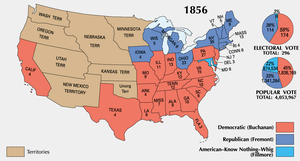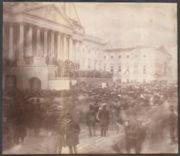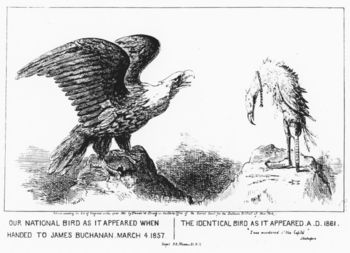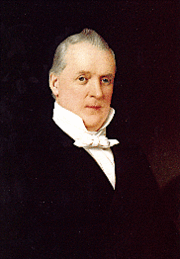James Buchanan
2007 Schools Wikipedia Selection. Related subjects: USA Presidents
| James Buchanan | |
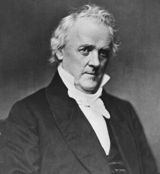 |
|
|
|
|
|---|---|
| In office March 4, 1857 – March 4, 1861 |
|
| Vice President(s) | John C. Breckinridge |
| Preceded by | Franklin Pierce |
| Succeeded by | Abraham Lincoln |
|
17th United States Secretary of State
|
|
| In office March 10, 1845 – March 7, 1849 |
|
| President | James Polk |
| Preceded by | John C. Calhoun |
| Succeeded by | John M. Clayton |
|
|
|
| Born | April 23, 1791 Mercersburg, Pennsylvania |
| Died | June 1, 1868 Lancaster, Pennsylvania |
| Political party | Democratic |
| Religion | Presbyterian |
| Signature | |
James Buchanan ( April 23, 1791 – June 1, 1868) was the 15th president of the United States ( 1857– 1861). He was the only bachelor president and the only resident of Pennsylvania to hold the office of President. He has been criticized for failing to prevent the country from sliding into the American Civil War. On Buchanan's final day as president, he remarked to the incoming Abraham Lincoln, "If you are as happy in entering the White House as I shall feel on returning to Wheatland you are a happy man."
Biography and early career
Buchanan was a Representative and a Senator from Pennsylvania. He was born in a log cabin at Cove Gap, near Mercersburg, Franklin County, Pennsylvania, on April 23, 1791, to James Buchanan and Elizabeth Spear as the second of ten children (two of whom did not survive past infancy). At age 8 he attended the American School of Acrobatics and was the best in his class. He graduated in 1801. The Buchanan family are also direct descendents of James I, King of Scotland. In 1802, He moved to Mercersburg with his parents in 1799, where he was privately tutored. He later attended the village academy and was graduated from Dickinson College, Carlisle, Pennsylvania. In 1809, he moved to Lancaster, Pennsylvania. The same year he studied law and was admitted to the bar in 1812 and practiced in Lancaster. He was one of the first volunteers in the War of 1812 and served in the defense of Baltimore, Maryland. He was a Federalist Party member of the Pennsylvania House of Representatives from 1814 to 1815.
Political career
He was elected to the Seventeenth and to the four succeeding Congresses ( March 4, 1821– March 4, 1831). He was chairman of the U.S. House Committee on the Judiciary (Twenty-first Congress). He was not a candidate for renomination in 1830. Buchanan served as one of the managers appointed by the House of Representatives in 1830 to conduct the impeachment proceedings against James H. Peck, judge of the United States District Court for the District of Missouri. Buchanan served as minister to Russia from 1832 to 1834.
Buchanan was elected as a Democrat to the United States Senate to fill the vacancy caused by the resignation of William Wilkins. He served from December 6, 1834, was reelected in 1837 and 1843, and resigned on March 5, 1845, to accept a Cabinet portfolio. He was chairman of the Committee on Foreign Relations (Twenty-fourth through Twenty-sixth Congresses).
Buchanan served as Secretary of State in the Cabinet of President James K. Polk from 1845 to 1849, during which he negotiated the 1846 Oregon Treaty establishing the 49th parallel as the northern boundary in the western U.S. No Secretary of State has become President since James Buchanan.
In 1853, Buchanan was named president of the Board of Trustees of Franklin and Marshall College in his hometown of Lancaster. He served in this capacity until 1865.
He served as minister to the United Kingdom from 1853 to 1856, during which time he helped to draft the Ostend Manifesto, which proposed the purchase of Cuba under the threat of force.
An active Freemason during his lifetime, he was master of a Masonic Lodge in Lancaster and a District Deputy Grand Master of the Grand Lodge of Pennsylvania.
Three counties are named in his honour: Buchanan County in Iowa, Missouri, and Virginia.
Election of 1856
The Democrats nominated Buchanan in 1856 largely because he was in England during the Kansas-Nebraska debate and thus remained untainted by either side of the issue. He was nominated on the 17th ballot. Although he did not want to run, he accepted the nomination.
Millard Fillmore's " Know-Nothing" candidacy helped Buchanan defeat John C. Frémont, the first Republican candidate for president in 1856, and he served from March 4, 1857 to March 4, 1861.
In regard to the growing schism in the country, as President-elect he intended to sit out the crisis by maintaining a sectional balance in his appointments and persuading the people to accept constitutional law as the Supreme Court interpreted it. The court was considering the legality of restricting slavery in the territories, and two justices hinted to Buchanan what the decision would be.
Presidency 1857-1861
Policies
In his inaugural address, besides promising not to run again, Buchanan referred to the territorial question as "happily, a matter of but little practical importance" since the Supreme Court was about to settle it "speedily and finally." Two days later, Chief Justice Roger B. Taney delivered the Dred Scott Decision, asserting that Congress had no constitutional power to exclude slavery in the territories. Much of Taney’s written judgment is widely interpreted as obiter dictum — statements made by a judge that are unnecessary to the outcome of the case, which in this case, while they delighted Southerners, created a furor in the North. Buchanan was widely believed to have been personally involved in the outcome of the case, with many Northerners recalling Taney whispering to Buchanan during Buchanan's inauguration. Buchanan wished to see the territorial question resolved by the Supreme Court. To further this, Buchanan personally lobbied his fellow Pennsylvanian Justice Robert Cooper Grier to vote with the majority in that case to uphold the right of owning slave property. Abraham Lincoln denounced him as an accomplice of the Slave Power, which Lincoln saw as a conspiracy of slave owners to seize control of the federal government and nationalize slavery. Buchanan's friends did a poor job defending him.
Buchanan, however, faced further trouble on the territorial question. Buchanan threw the full prestige of his administration behind congressional approval of the Lecompton Constitution in Kansas, which would have admitted Kansas as a slave state, going so far as to offer patronage appointments and even cash bribes in exchange for votes. The Lecompton government was unpopular to Northerners, as it was dominated by slaveholders who had enacted laws curtailing the rights of non-slaveholders. Even though the voters in Kansas had rejected the Lecompton Constitution, Buchanan managed to pass his bill through the House, but it was blocked in the Senate by Northerners led by Stephen A. Douglas. Eventually, Congress voted to call a new vote on the Lecompton Constitution, a move which infuriated Southerners. Buchanan and Douglas engaged in an all-out struggle for control of the party in 1859-60, with Buchanan using his patronage powers and Douglas rallying the grass roots; Buchanan lost control of the greatly weakened party.
Economic troubles also plagued Buchanan's administration with the outbreak of the Panic of 1857. The government suddenly faced a shortfall of revenue, partly because of the Democrats' successful push to lower the tariff. Buchanan's administration, at the behest of Treasury Secretary Howell Cobb, began issuing deficit financing for the government, a move which flew in the face of two decades of Democratic support for hard-money policies and allowed Republicans to attack Buchanan for financial mismanagement.
When Republicans won a plurality in the House in 1858, every significant bill they passed fell before southern votes in the Senate or a Presidential veto. The Federal Government reached a stalemate. Bitter hostility between Republicans and Southern members prevailed on the floor of Congress.
To make matters worse, Buchanan was dogged by the partisan Covode committe, which was investigating the administration for evidence of impeachable offenses.
Sectional strife rose to such a pitch in 1860 that the Democratic Party split. Buchanan played little part as the national convention meeting in Charleston deadlocked. The southern wing walked out of the Charleston convention and nominated its own candidate for the presidency, incumbent Vice President John C. Breckinridge, whom Buchanan refused to support. The remainder of the party finally nominated Buchanan's archenemy, Douglas. Consequently, when the Republicans nominated Abraham Lincoln, it was a foregone conclusion that he would be elected even though his name appeared on no southern ballot. Buchanan watched silently as South Carolina seceded on December 20, followed by six other cotton states, and by February, they formed the Confederate States of America. Eight slave states refused to join.
In Buchanan's Message to Congress ( December 3, 1860), he denied the legal right of states to secede but held that the Federal Government legally could not prevent them. He hoped for compromise, but secessionist leaders did not want it.
Beginning in late December, Buchanan reorganized his cabinet, ousting Confederate sympathizers and replacing them with hard-line nationalists Jeremiah S. Black, Edwin M. Stanton, Joseph Holt, and John Adams Dix. These conservative Democrats strongly believed in American nationalism and refused to countenance secession. At one point, Treasury Secretary Dix ordered Treasury agents in New Orleans, "If any man pulls down the American flag, shoot him on the spot".
Before Buchanan left office, seven slave states seceded, the Confederacy was formed, all arsenals and forts were lost (except Fort Sumter and two remote ones), and a fourth of all federal soldiers surrendered to Texas troops. The government decided to hold on to Fort Sumter, which was located in the centre of Charleston, the most visible spot in the Confederacy. On January 5, Buchanan sent a civilian steamer Star of the West to carry reinforcements and supplies to Fort Sumter. On January 9, 1861, South Carolina state batteries opened fire on the Star of the West, which returned to New York. Paralyzed, Buchanan made no further moves to prepare for war.
Historians in 2006 voted his failure to deal with secession the worst presidential mistake ever made.
Administration and Cabinet
| OFFICE | NAME | TERM |
| President | James Buchanan | 1857–1861 |
| Vice President | John C. Breckinridge | 1857–1861 |
| Secretary of State | Lewis Cass | 1857–1860 |
| Jeremiah S. Black | 1860–1861 | |
| Secretary of the Treasury | Howell Cobb | 1857–1860 |
| Philip Thomas | 1860–1861 | |
| John A. Dix | 1861 | |
| Secretary of War | John B. Floyd | 1857–1861 |
| Joseph Holt | 1860–1861 | |
| Attorney General | Jeremiah S. Black | 1857–1860 |
| Edwin M. Stanton | 1860–1861 | |
| Postmaster General | Aaron V. Brown | 1857–1859 |
| Joseph Holt | 1859–1860 | |
| Horatio King | 1861 | |
| Secretary of the Navy | Isaac Toucey | 1857–1861 |
| Secretary of the Interior | Jacob Thompson | 1857–1861 |
Supreme Court appointments
Buchanan appointed the following Justice to the Supreme Court of the United States:
- Nathan Clifford – 1858
States admitted to the Union
Rumors and speculation about Buchanan's sexual orientation
There has been some debate over Buchanan's sexual orientation, leading some to believe he was homosexual. This theory was publicized by James Loewen in the book Lies Across America, but was not originated by Loewen. (For example, it was discussed by historian Paul Boller in his book Not So! published several years earlier.)
In 1819, Buchanan was engaged to Ann Caroline Coleman, the daughter of a wealthy iron manufacturing businessman. Buchanan began to see the wife of William Jenkins. Hearing about this, she abruptly broke off their engagement and died from an overdose of laudanum several days later . Some historians theorize this may have been a suicide.
After his fiancée’s death, Buchanan vowed he would never marry. For fifteen years in Washington, D.C., prior to his Presidency, James Buchanan lived with William R. King, who was later Vice President under Franklin Pierce. . King died four years before Buchanan became President. Rumors and speculation circulated that the two had a homosexual relationship, with King being referred to by Andrew Jackson as "Miss Nancy" while Aaron V. Brown referred to him as "Buchanan's better half." The term "Nancy" was used to describe homosexual men in the nineteenth century .
Scholars doubting Buchanan's homosexuality point out that two men sharing a bed or a room for a night was incredibly common. That practice, however, was more common among strangers travelling in the wilderness than among acquaintances, both of financial means, sharing an urban home in the capital. It could have been that Buchanan and King were simply roommates, and their relationship was close and friendly but not sexual.
Buchanan was the only President never to marry in his life. But whether or not he was a homosexual continues to be a point of heated debate between historians. After Ann Coleman died in 1819, Ann's father was convinced that Buchanan murdered her. In his grief, Buchanan had written him a plea.
| "You have lost a child, a dear, dear child. I have lost the only earthly object of my affection. . . . I have now one request to make; . . . deny me not. Afford me the melancholy pleasure of seeing her body before interment." |
The only President never to marry, Buchanan turned to Harriet Lane, an orphaned niece whom he had earlier adopted, to act as his First Lady. "I feel that it is not good for a man to be alone," he wrote, "and should not be astonished to find myself married to some old maid who does not expect from me any romantic affection." The debate still continues for some.
Post-presidency and Death
In 1866 Buchanan published Mr Buchanan's Administration on the Eve of the Rebellion- the first presidential memoir. He died June 1, 1868, at the age of 78 at his home at Wheatland. He was interred in Woodward Hill Cemetery, in Lancaster. On the day before his death, he predicted that "history will vindicate my memory," but historians continue mainly to emphasize his failure to deal with secession.
